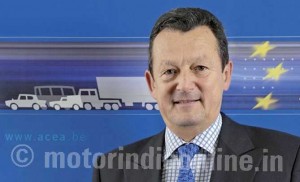
The European Automobile Manufacturers’ Association (ACEA) has welcomed the legislative proposal on eCall published by the European Commission, and calls on all stakeholders to work together to deliver safe and affordable motoring on Europe’s roads. The industry is committed to drastically reducing the number of deaths involving motor vehicles. The roll-out of eCall is just one of many developments designed to reduce road-related casualties.
“eCall has the potential to save lives by shortening reaction time, enabling emergency services to respond as rapidly as possible within the ‘golden hour’ after an accident,” stated the ACEA Secretary General, Mr. Ivan Hodac.

In August 2004, ACEA became one of the first signatories of the memorandum of understanding on eCall, a system designed to automatically alert emergency services in the event of a road accident or collision. Alongside its members, ACEA has actively participated in developing effective solutions for pan-European 112 eCall.
Any public eCall service must be pan-European and available to all customers before the system becomes obligatory. To work properly therefore, EU infrastructure must be ready and able to receive eCalls. “Throughout the development process ACEA has consistently outlined the importance of parallel contributions from all stakeholders,” said Mr. Hodac.
The other stakeholders must uphold their commitments to the technology, Public Service Answering Points (PSAPs) must be ready in all member-States, and mobile network operators need to be prepared before in-vehicle systems are enforced.
To make the adoption of eCall cost-effective, ACEA calls for adaptable eCall solutions based on technology-neutral legislative requirements, permitting embedded mobile phone-based and third-party solutions.
The current proposal does not specify the eCall system’s precise technical requirements, which would be expected in a subsequent Delegated Act in 2014. “The automobile industry is very concerned that the proposed October 2015 entry into force does not respect the 36-month lead-time that the industry will need to implement the technical adaptations, as recommended in CARS 2020. Also, considering the member-States’ requirement for working infrastructure to be in place, the time needed for legislative procedure and the need to assess the technical and legal challenges, this target date is highly ambitious”, added Mr. Hodac.
The ACEA members are the BMW Group, DAF Trucks, Daimler, FIAT S.p.A., Ford of Europe, General Motors Europe, Hyundai Motor Europe, IVECO S.p.A., Jaguar Land Rover, PSA Peugeot Citroën, Renault Group, Toyota Motor Europe, Volkswagen Group, Volvo Cars and Volvo Group.